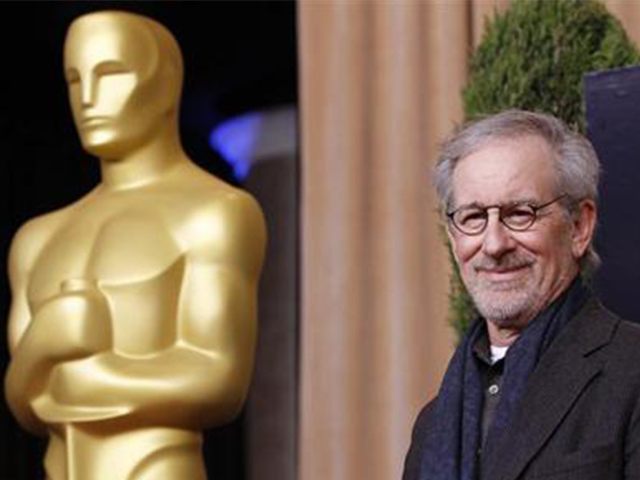Hollywood titan Steven Spielberg became the latest industry figure to weigh in on the #OscarsSoWhite controversy on Thursday, saying in an interview that he does not believe there is “inherent or dormant racism” in the Academy of Motion Picture Arts and Sciences (AMPAS) and that he is “not 100 percent” supportive of the Academy’s dramatic rule changes to increase diversity within the organization.
In an extensive interview on the Hollywood Reporter‘s “Awards Chatter” podcast, the three-time Oscar-winner said that he was “surprised” that NWA biopic Straight Outta Compton failed to earn a Best Picture nomination, and that Idris Elba failed to earn an acting nod for his role in the Netflix war drama Beasts of No Nation.
However, the director said that the perceived snubs for those films are not rooted in racism within AMPAS, as critics have charged. Spielberg said that the #OscarsSoWhite controversy — which erupted anew last month after the Academy nominated exclusively white actors in top categories for a second consecutive year — was rooted more in a lack of diversity among filmmakers, screenwriters and studio executives.
“You have to look back a couple of years, where Lupita [Nyong’o] was recognized for 12 Years a Slave [and] 12 Years a Slave won Best Picture, you know?” Spielberg told THR. “I don’t believe that there is inherent or dormant racism because of the amount of white Academy members.”
With stars like Will Smith and Spike Lee pledging to boycott this year’s Oscars, the Academy unveiled a dramatic overhaul of its voting rules and organizational structure last month, with the aim of doubling the number of female and minority Academy voters by 2020. The rules limit voting rights to Academy members who have been “active” in filmmaking over at least a 10-year period.
In a series of open letters after the rule changes were announced, many longtime Academy members blasted the organization for what they charged was an overt effort to strip older, white members of their voting rights in order to boost the number of younger, more politically correct voters.
In his interview with THR, Spielberg — whose film Bridge of Spies is up for Best Picture this year — said he was “not 100 percent” supportive of the Academy’s rule changes, which will not affect the voting for this year’s Oscars.
“I’m also not 100 percent sure that taking votes away from Academy members who have paid their dues and maybe are retired now and have done great service — maybe they’ve not won a nomination, which would have given them immunity to the new rules, but they have served proudly and this is their industry too — to strip their votes? I’m not 100 percent behind that,” he said.
Spielberg was quick to add that he thinks it is “very, very important” that the Academy has begun to open up its membership to more diverse filmmakers “in a proactive way.”
“But it’s not just the Academy, and I think we have to stop pointing fingers and blaming the Academy,” he told THR. “It’s people that hire, it’s people at the main gate of studios and independents. It’s the stories that are being told. It’s who’s writing diversity — it starts on the page. And we all have to be more proactive in getting out there and just seeking talent.”
When asked whether he takes the diversity of cast and crew members into account when staffing his own projects, Spielberg said his films have often included actors and crew members from diverse backgrounds even without consciously considering the issue.
“Look, I have two black children, you know? I’ve been colorblind my entire life,” he said. “When you just look at the films I’ve made, and look at the people who’ve worked on those films — look at the diversity within the crew, within the cast — I’ve always [had it].”
In addition to Best Picture, Spielberg’s Bridge of Spies is up for five additional Oscars at this year’s ceremony, including Best Supporting Actor for Mark Rylance and Best Original Screenplay for Matt Charman and Joel and Ethan Coen. Spielberg has been nominated for Best Director seven times over his decades-long career, winning twice for 1993’s Schindler’s List and 1998’s Saving Private Ryan. He was also awarded the Irving Thalberg honorary Oscar in 1987.
The 88th Academy Awards air Sunday, February 28 on ABC.

COMMENTS
Please let us know if you're having issues with commenting.